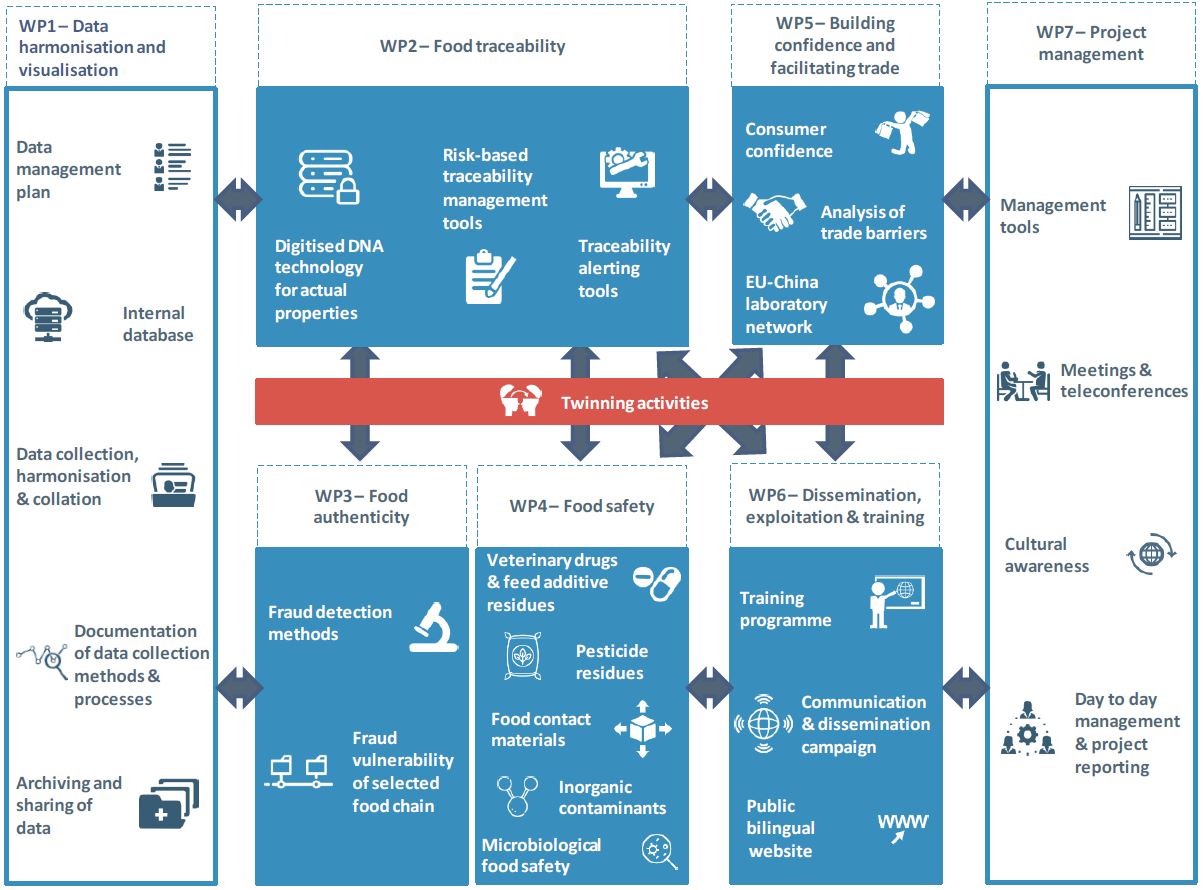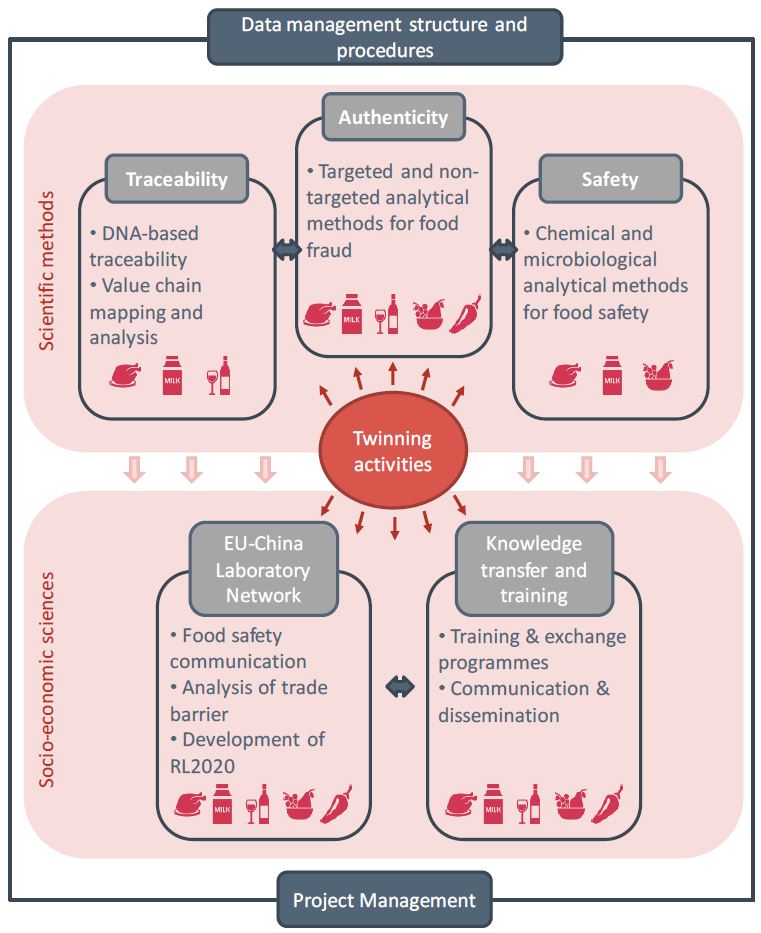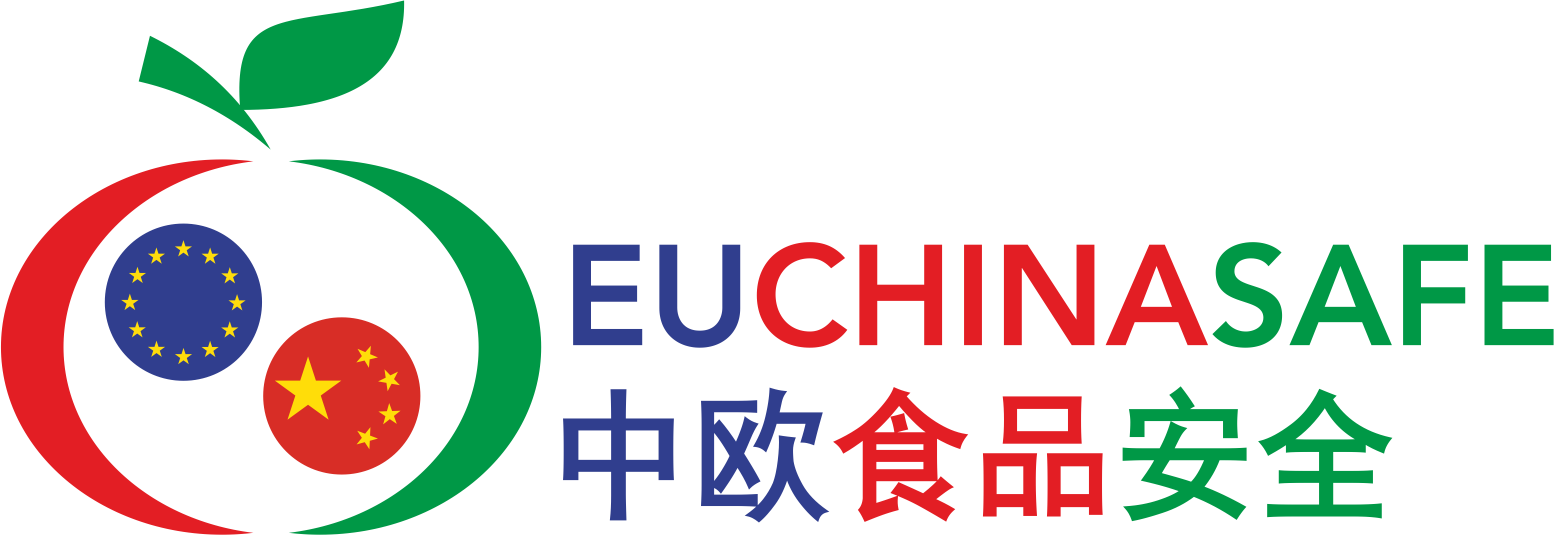A highly structured 48 months work plan has been drawn up by the EU-China-Safe to build preparedness to prevent, deter and manage various types of food crises in the food chain, caused by a contamination incident or fraud, which may have a different impact depending on the type of incident (microbiological or chemical incident, fraud, threats or mislabelling).
5 integrated research and innovation work packages (WP) have been designed, and 3 overarching data management, project management and ethics requirements work packages.
The overall goal of WP1 is to coordinate the collection, harmonization, sharing and archiving of data collected and generated by the project, at least on the EU side, and to document data collection methods and procedures. As a support WP, WP1 enable WP2, WP3 and WP4 to do their job in an efficient way without duplicating efforts or wasting time on technical issues. To reach this goal, the following objectives have been defined:
The main challenge related to food product traceability is that there is not
necessarily a connection between the actual property a food product has (e.g. the
actual species used, origin of, or eco-label status of the product) and the claim
made in the traceability system which in principle may be true or false (and
deciding which is the case is not trivial).
WP2 will take two innovative approaches to establishing the veracity of traceability
system claims; one approach based on DNA-based traceability and block chain
technology, and another approach based on detecting inconsistencies in recorded
claims by undertaking value chain mapping and analysis. This gives rise to three
main objectives for WP2:
WP3 will address the development, knowledge transfer and implementation of innovative
research methods and processes for combating food fraud. Methodologies for detection
of food fraud developed both in the EU and China will be transferred both ways, from
the EU to China, and from China to the EU.
Methods from previous research and established practices (in the EU and China) will
be exchanged and methods implemented. For each food type, a team of EU, Chinese and
industry partners has been set up. The methodology will focus on five product groups
which are all very susceptible to fraud, i.e. wine, dairy products (infant formula),
processed meat, organic fruit and vegetables, and spices.
Methodologies are based on the latest technology and include state-of-the-art
laboratory-based confirmatory methods.
Handheld, portable machine vision based methods for on-site screening will be
trialled.
In most cases the Standard Operating Procedures of the existing methodology will be
exchanged and the methods implemented in the laboratories of the other partners.
Exchange of samples and first local surveys will allow the methods to be practiced
and performance of the methods compared, whereas a first impression of the
prevalence of fraud in those areas will be gathered.
Leader: Saskia van Ruth (Wageningen University and Research, The Netherlands
Differences in licensing, regulations and food testing methods have huge potential to
disrupt international trade. A EU-China research programme focussing on meat, dairy
products and, fruits and vegetables will be undertaken to address these issues. The
strengths of each method will be assessed and modified if necessary for future
technology readiness and application. Method transfer will be achieved following
harmonisation activities (WP5) and workshops (WP6).
WP4 has four main objectives:
WP5 will integrate natural and social sciences by examining laboratory response,
consumer confidence, mitigation of divergent food safety standards through common
risk analysis considerations and analysis of economic costs of food incidents.
Twinning will take place between corresponding Reference laboratories between EU and
China to facilitate knowledge transfer (two ways) of existing best practice.
A virtual laboratory (RL2020) will be established to showcase new best practice,
ensure harmonisation of laboratory procedures and to build confidence and mutual
recognition of results. There will be a strong focus on exchanging best practices
between the EU and China and will ensure that there is a full understanding of food
safety and authenticity requirements to support compliance of exporting companies
with both the EU and Chinese requirements, in support of enhancing bilateral trade
of food/agri-food commodities. Emphasis will be placed on reaching consistent
laboratory testing regimes as well as food safety standards underpinned by robust
risk assessment, with the aim of bolstering consumer confidence in both
jurisdictions.
Leader: Susan MacDonald (Fera Science Ltd., UK)
Knowledge transfer, together with training, is the key instrument for reinforcing
cooperation and increasing the level of collaboration as well as enhancing synergy
between the EU and China in food safety area. All training, dissemination and
exploitation activities will be channelled through WP6 to ensure effective
management and achievement of the project aims. WP6 will deal with communication
within the project partners and support the working synergies to be found between
on-going EC projects. It will maximise impact delivery in terms of improving safety
of food supply and increasing consumer confidence in imported/exported agri-food
products.
Objectives:
Efficient project management and coordination of the project activities to ensure
timely completion of all objectives, milestones and deliverables.
The specific objectives of this WP are the following:
Coordinator: Queens University Belfast, UK
This work package sets out the 'ethics requirements' that the project must comply with.
Coordinator: Queens University Belfast, UK

EU-China-Safe activities will focus on the commodities that are most relevant to EU-China
trade and on food safety and authenticity issues:
5 main food products, namely dairy products (mainly infant formula), processed meat,
wine, fruits/vegetables, and spices, which have been at the heart of recent food safety
scares, scandals, and trading difficulties both in Europe and in China.


 This project has received funding from the European Union ��s
Horizon 2020 research and innovation programme under grant agreement No. 727864 and
from the Chinese Ministry of Science and Technology (MOST).
This project has received funding from the European Union ��s
Horizon 2020 research and innovation programme under grant agreement No. 727864 and
from the Chinese Ministry of Science and Technology (MOST).
Disclaimer: The content of this website does not reflect the
official opinion of the European Commission and/or the Chinese government.
Responsibility for the information and views expressed therein lies entirely with
the author(s).
� 2018-2020 EU-CHINA-SAFE. All rights reserved | Design by W3layouts
